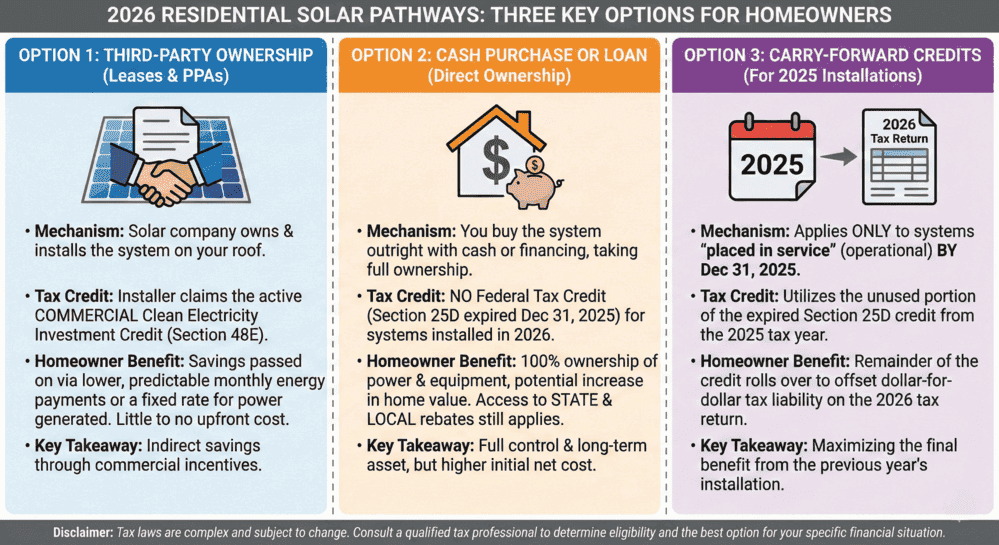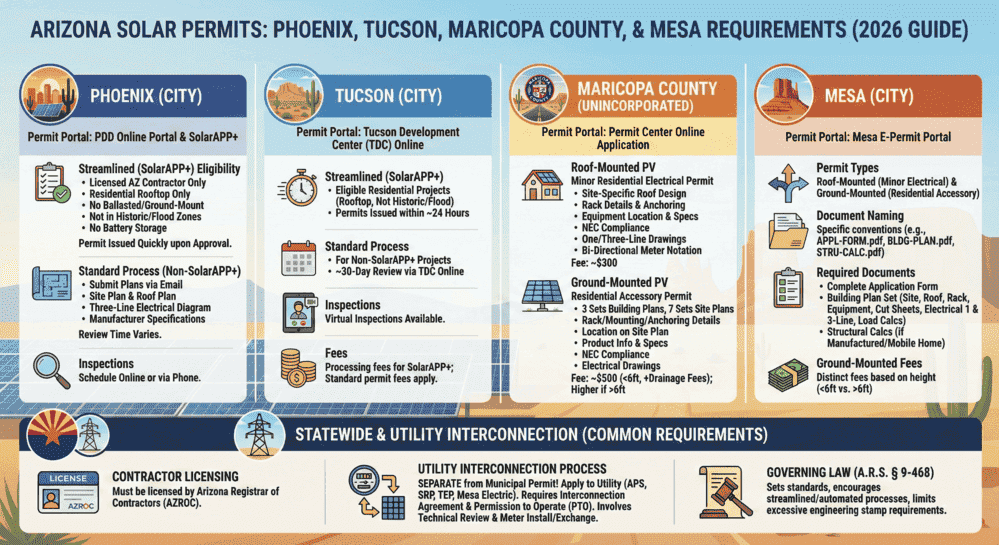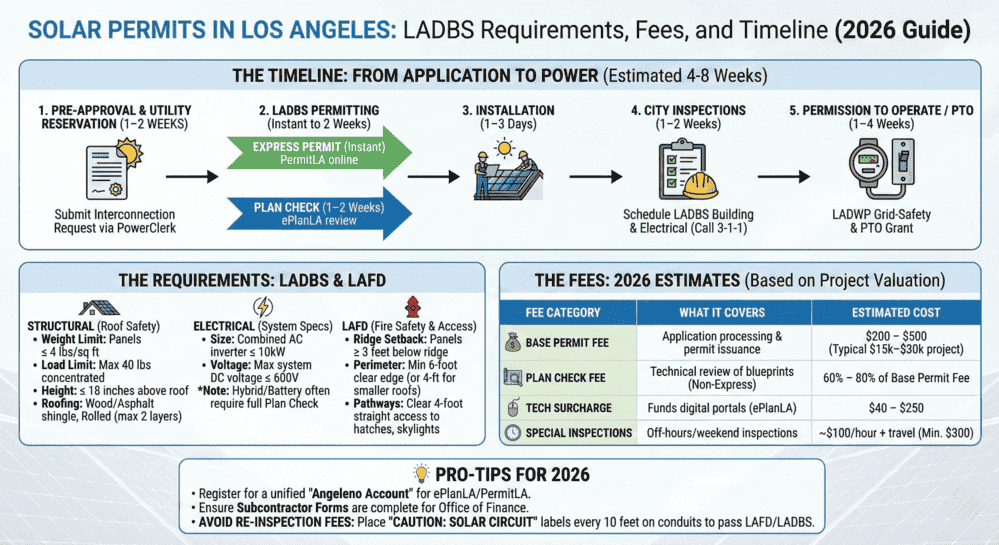Solar permits are official authorizations from local government agencies required to legally install solar panel systems on residential or commercial properties. Most solar installations need building permits, electrical permits, or dedicated solar permits to ensure compliance with National Electrical Code (NEC) standards and local building codes. Permit costs typically range from $150-$400 for residential systems under 10 kilowatts, while commercial permits can cost $500-$2,400 depending on system size. The approval process takes 2-6 weeks for residential projects and 1-3 months for commercial installations.

Understanding Solar Permits
A solar permit represents an official authorization from local government agencies that grants permission for installing solar panels and photovoltaic systems. These permits serve as mandatory requirements across numerous jurisdictions, ensuring every solar installation adheres to both local regulations and federal building codes while meeting established safety standards.
The Purpose Behind Solar Permits
Solar permits fulfill the same fundamental role as any construction permit: confirming that systems operate safely and comply with applicable codes. These authorizations safeguard homeowners, business operators, and the broader electrical grid infrastructure.
Essential Solar Permit Requirements
Requirements for solar permits differ substantially across jurisdictions, though most installations demand several critical approvals before work can begin legally. According to the U.S. Department of Energy’s permitting guidelines, expect to need at least one of these permits:
Building Permit: Validates structural soundness and confirms adherence to local building codes and zoning regulations. Assessments cover roof load capacity, mounting system specifications, and comprehensive design details.
Electrical Permit: Addresses all electrical components and wiring installations, ensuring compliance with National Electrical Code (NEC) standards.
Dedicated Solar Permit: Numerous jurisdictions now provide specialized permits designed exclusively for solar installations, occasionally referred to as PV permits. These all-inclusive permits frequently merge building and electrical requirements into one unified approval pathway, reducing paperwork complexity for installers.
Grid Connection Approval: Mandatory for grid-connected systems to guarantee secure integration with existing electrical infrastructure. This authorization usually requires utility companies to examine inverter specifications, disconnect switch locations, and overall system capacity.
Keep in mind that solar permit specifics depend on your local jurisdiction. For precise requirements applicable to your project, contact your local government offices to determine what documentation you’ll need.
Commercial Solar Permit Specifications
Commercial solar installations face more rigorous permit requirements compared to residential properties.
Additional requirements may encompass:
- Single-line diagrams bearing professional engineer (PE) certification stamps
- Land use assessment
- Environmental Protection Agency (EPA) authorization
Solar Permit Solutions
Skip the Permit Headaches
We design plan sets that pass inspection the first time. Code-compliant, PE-stamped, accepted by AHJs nationwide.
Solar Permit Fee Structure
Plan to invest between $150 and $400 in permit fees for systems under 10 kilowatts.
However, permit costs fluctuate considerably depending on jurisdiction. Fees are typically determined by system size, with residential permits generally costing less than commercial ones.
Several states have established maximum fees for solar permits to promote renewable energy adoption:
Colorado: The Fair Permit Act establishes fee caps at $500 for residential solar installations and $1,000 for commercial solar panel systems.
California: California restricts total solar permit costs as follows:
- Residential systems of 15 kW or less: $450
- Residential systems exceeding 15 kW: $450 plus $15 per kW above 15
- Commercial systems 50 kW or less: $1,000
- Commercial systems between 50 and 250 kW: $1,000 plus $7 per kW above 50
- Commercial systems above 250 kW: $2,400 plus $5 per kW over 250 kW
Generally, solar permits and related fees (including interconnection charges) comprise approximately 8% of total solar installation expenses.

Navigating the Solar Permit Process
Prevent permit-related delays from disrupting your installation schedule. Streamlining your solar permit processing requires dividing the journey into distinct stages that keep projects progressing smoothly and efficiently. Follow this strategic roadmap for navigating permit approvals:
Initial Project Assessment
A comprehensive initial evaluation establishes the foundation for successful applications and efficient installations. This vital opening phase requires thorough site examination and preliminary planning.
Critical assessment elements include:
Site Analysis: Assess roof condition, structural strength, and available mounting areas. For ground-mounted systems, evaluate soil composition and terrain features.
Solar Access Study: Record shading patterns, sunlight exposure duration, and potential obstacles that might affect system output.
Electrical Infrastructure: Examine current electrical service capacity, panel positions, and feasible interconnection locations.
Jurisdiction Requirements: Investigate local building codes, zoning limitations, and specific solar installation mandates that will influence permit submissions.
Preparing Your Application
Careful preparation of required documentation prevents expensive revision rounds and accelerates permit approval.
Critical application components typically include:
Technical Documentation: Comprehensive site plans, single-line electrical diagrams, and structural engineering calculations
Equipment Specifications: Manufacturer specification sheets for solar permit equipment requirements including panels, inverters, and mounting systems
Project Narratives: Precise descriptions of installation procedures and safety protocols
Supporting Documents: Property documentation, contractor licensing credentials, and insurance verification
Application Review Period
Review timelines vary dramatically based on jurisdiction capacity and project complexity. According to NREL’s comprehensive permitting analysis, standardized processes can significantly reduce approval times.
Standard solar permit timelines according to NREL’s permitting research:
- Residential projects: 2-6 weeks for conventional installations
- Commercial projects: 1-3 months, varying with system scale and complexity
- Large-scale systems: 3+ months, frequently requiring supplementary environmental or utility assessments
Maintain an active role during this stage by checking your application status consistently. Reply quickly to reviewer inquiries and record all exchanges with permit authorities.
Permit Approval and Inspections
The inspection stage demands careful scheduling between installation crews and local inspectors.
Critical inspection elements:
Pre-installation Check: Confirm all permit stipulations before commencing work
Progress Inspections: Arrange required inspections at crucial installation milestones
Final Inspection: Develop comprehensive checklist of requirements for ultimate approval
Documentation: Keep organized files of all inspection documentation and correspondence

Solar Panel Inspection Costs
Inspection expenses vary significantly based on jurisdiction and project parameters, though they typically constitute a minor fraction of the overall permitting budget. Solar installation businesses should budget for:
Residential Inspections
- Basic inspection fees: $200-400 for standard rooftop systems
- Re-inspection fees: $100-150 when corrections are necessary
- Express inspection services (where offered): Additional $150-300 for accelerated scheduling
Commercial Inspections
- Base inspection fees: $500-1,500, increasing with system dimensions
- Progress inspection costs: $200-400 per visit for larger projects requiring multiple inspections
- Third-party inspection services: $800-2,000 for complex projects demanding specialized expertise

Common Solar Permit Obstacles
Even experienced solar installers encounter permitting barriers that can jeopardize project schedules and challenge customer relationships. Avoiding common mistakes when applying for solar permits requires addressing these three major obstacles that commonly obstruct applications:
HOA and Multi-Unit Property Limitations
Homeowners’ Associations frequently create substantial obstacles for residential solar projects. While numerous HOAs maintain outdated or excessively restrictive solar policies, most states have enacted solar access laws protecting homeowners’ rights to install solar panels.
When confronting HOA opposition, examine how HOA regulations impact solar permit approvals first, these statutes typically supersede HOA restrictions and can facilitate faster approval.
Historical Buildings
Solar installation on historical properties demands careful navigation of preservation requirements. Success typically hinges on innovative design approaches that preserve historical character while accomplishing energy objectives.
Explore these strategies:
- Low-profile mounting systems minimizing visual impact
- Solar shingles or alternative building-integrated PV products harmonizing with historical aesthetics
- Strategic panel positioning on non-visible roof areas
- Custom conduit routing preserving architectural elements
Commercial Solar Farm Zoning
Utility-scale solar installations regularly face zoning challenges, especially on agricultural lands. Resources like Penn State Extension’s ordinance considerations and Michigan State’s planning guide provide valuable frameworks for navigating these complexities.
When permits get denied for commercial projects, attempt these solutions:
- Collaborate with seasoned land use attorneys to analyze local ordinances comprehensively
- Commission thorough environmental impact assessments addressing specific concerns
- Create detailed wildlife protection strategies
- Evaluate alternative locations within the same utility service territory
- Present economic advantage studies to local planning commissions
Optimizing the Solar Permitting Process
The construction industry universally acknowledges that permit processes remain unnecessarily complicated and confusing. This stems partially from the absence of standardized permitting procedures, and partially because permit requirements invariably depend on your specific project and jurisdiction.
Consider these strategies to optimize your solar permitting workflow:
Engage Industry Experts
While solar energy isn’t a new industry, the specialized work involved remains unique to this sector. Solar installation isn’t suitable for DIY approaches; it demands consultants with substantial experience to navigate intricate solar permit regulations.
Professional solar permit services can identify common obstacles within the process and establish efficient permitting workflows while avoiding typical pitfalls. Organizations like SolSmart offer valuable resources for both installers and municipalities.
Adopt Permitting Technology
Utilizing modern software solutions can streamline the permitting process significantly. Digital permitting platforms help organize and monitor all necessary documents and approvals centrally.
Technology solutions reduce potential delays related to permit approval processes or inspections. Features like automated reminders, progress monitoring, and communication channels provide centralized databases for your permit applications.
Standardize and Maintain Clear Communication
Working within large teams presents communication consistency challenges. According to SolSmart’s construction codes and permitting guide, establish clear communication protocols and uphold those procedures.
To prevent communication failures, consolidate all project communications in one centralized location, such as dedicated permitting software. This approach documents communications and establishes a single source of truth for every team member, enabling everyone to quickly grasp a permit’s status instantly.
Successfully Managing Solar Permits
Adopting solar energy hardware represents the initial step toward a more sustainable future. Whether you’re pursuing residential solar design or off-grid solar system design, creating efficient permitting processes becomes crucial for streamlining workflows, collaborating with solar specialists, and utilizing appropriate technology to deploy solar systems successfully.
Through effective solar permit management, your team can swiftly navigate essential steps required to bring your solar project to fruition.
Conclusion
Successfully navigating the solar permitting landscape represents a critical milestone in your renewable energy journey. While the process may seem daunting with its varying requirements, multiple approval stages, and jurisdiction-specific regulations, understanding each step empowers you to move forward with confidence.
The key to solar permitting success lies in three fundamental principles: thorough preparation, proactive communication, and strategic patience. By conducting comprehensive initial assessments, assembling complete documentation packages, and maintaining open dialogue with local authorities, you’ll minimize delays and avoid costly revisions. Resources like NYSERDA’s Solar Guidebook and UMass’s community planning toolkit provide additional jurisdiction-specific guidance. Remember that permit costs and timelines vary significantly by location and project scale, so early research into your specific jurisdiction’s requirements will pay dividends throughout the process.
Whether you’re installing a residential rooftop system or developing a commercial solar farm, the permitting phase serves as more than just a bureaucratic hurdle, it’s a crucial safeguard ensuring your investment operates safely, efficiently, and in harmony with your community’s electrical infrastructure. Partner with experienced solar professionals at Solar Permit Solutions, leverage available technology, and approach each permitting requirement as an opportunity to validate the quality and safety of your installation.
The effort invested in proper permitting today translates directly into years of reliable, compliant renewable energy production tomorrow. With the right preparation and mindset, you’ll transform the solar permitting process from an obstacle into a manageable milestone on your path to clean energy independence.
FAQs
Skip the Permit Headaches
We design plan sets that pass inspection the first time. Code-compliant, PE-stamped, accepted by AHJs nationwide.
Frequently Asked Questions
The solar permit approval timeline varies considerably based on jurisdiction workload and project complexity. Residential installations typically require 2-6 weeks for standard rooftop systems, while commercial projects may take 1-3 months depending on system size and technical specifications. Large-scale solar farms often face review periods exceeding 3 months, particularly when environmental assessments or additional utility coordination is required. To expedite your approval, submit complete documentation packages, respond promptly to reviewer questions, and consider reaching out to your local permitting office for specific timeline expectations in your area.
Installing solar panels without proper permits is illegal in most jurisdictions and strongly discouraged. Unpermitted solar installations can result in significant consequences including fines, mandatory system removal, difficulty selling your property, insurance claim denials, and potential safety hazards. Additionally, unpermitted systems typically cannot connect to the electrical grid, and you may forfeit valuable tax incentives and rebates available for compliant installations. Even in jurisdictions where small systems might have relaxed requirements, always verify local regulations with your municipal building department before proceeding with any solar installation.
Most jurisdictions require separate permits or amendments to existing solar permits when adding battery storage systems. Energy storage installations involve additional electrical and safety considerations, including fire safety protocols, proper ventilation, and specific mounting requirements. If you're planning to install batteries alongside your solar panels, inform your permitting office upfront, many jurisdictions now offer combined solar-plus-storage permits that streamline the approval process. Battery systems may also trigger additional inspections beyond standard solar requirements, particularly for larger commercial storage installations.
Permit denials aren't the end of your solar project, they're typically opportunities to address specific concerns and resubmit. Common denial reasons include incomplete documentation, structural inadequacy concerns, zoning conflicts, or design elements not meeting code requirements. When facing a denial, carefully review the official rejection notice to understand specific deficiencies, consult with solar professionals or engineers to address technical concerns, and engage with local planning officials to discuss acceptable modifications. Many initially denied applications receive approval after addressing reviewer concerns and resubmitting corrected documentation.
Solar permits themselves aren't typically transferred in real estate transactions, but properly permitted solar installations transfer with property ownership. During home sales, buyers and their lenders will verify that solar systems have proper permits, passed final inspections, and received official sign-off from local authorities. This documentation protects both parties and ensures the system's legality and insurability. If you're selling a home with solar panels, gather all original permits, inspection reports, and completion certificates to provide to potential buyers. Unpermitted systems can significantly complicate property sales and may require retroactive permitting, which can be more expensive and time-consuming than obtaining permits during initial installation.
SPS Editorial Team
Solar Permit Solutions
Solar Permit Solutions provides professional solar permit design services for residential, commercial, and off-grid installations across all 50 states. Our team ensures permit-ready plan sets delivered fast.
Related Articles

Section 25D Expiration: Homeowner Options In 2026
The Section 25D Residential Clean Energy Credit, which covered 30% of residentia...

Solar Permits In Arizona: Phoenix, Tucson, Maricopa County, And Mesa Requirements (2026 Guide)
Arizona solar permitting at a glance: Arizona HB2301 now requires every municipa...

Solar Permits in Los Angeles: LADBS Requirements, Fees, and Timeline (2026 Guide)
Quick Answer: Solar permits in Los Angeles are issued by LADBS and require LAFD ...
